Press Herald: Maine’s small wild blueberry farmers struggle on what they’re raking in
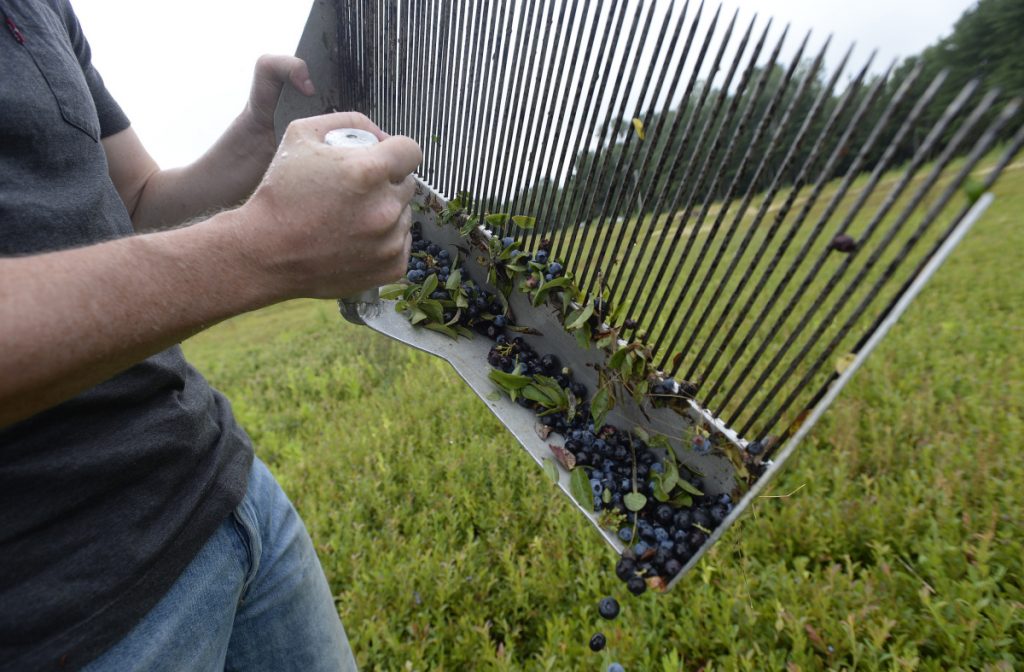
Tyler Bridges dumps a rakeful of wild blueberries into a wooden crate in a field in Crawford last month. Despite a financial situation that has reached crisis levels, the Bridges family has a three-generations-deep commitment to its 300 acres of fields Down East. Staff photo by Shawn Patrick Ouellette
by Mary Pols | September 9, 2018
Fierce competition from Canada, a glutted marketplace and inequitable USDA buybacks have made cultivating this iconic Maine crop a brutal business.
BARING — Greg Bridges was aware his wild blueberry fields in Washington County were looking ragged. There was fruit to be had, but it was far sparser than usual since Bridges didn’t have money for bees to boost pollination or chemicals to beat back weeds or fertilizers to improve the fruit, neither this year nor last. He calculates that after he’d paid the taxes on his patchwork of 300 acres spread around Crawford, Meddybemps, Charlotte and Cooper, blueberry farming cost him $2,000 last year.
Even if he’d had the money to improve the crop, it wouldn’t have been worth it. After farm expansions and record harvests, both in Maine and in Canada, the market has been glutted with wild blueberries, and there simply hasn’t been enough demand to use up the supply. Last year, Maine’s blueberry farmers got 26 cents a pound for the fruit they sold to the processors, who freeze and store it. That was the lowest price paid in 32 years.
The business is brutal. It makes no financial sense. A government bailout of sorts announced this summer helps just one producer, a big company with far deeper pockets than Bridges’. Nonetheless, the Bridges family hasn’t entirely abandoned the fields. Yet. Theirs is a three-generation-deep commitment. This season, which is drawing to a close, they raked only 20 of their 300 acres, enough for fresh market sales only.
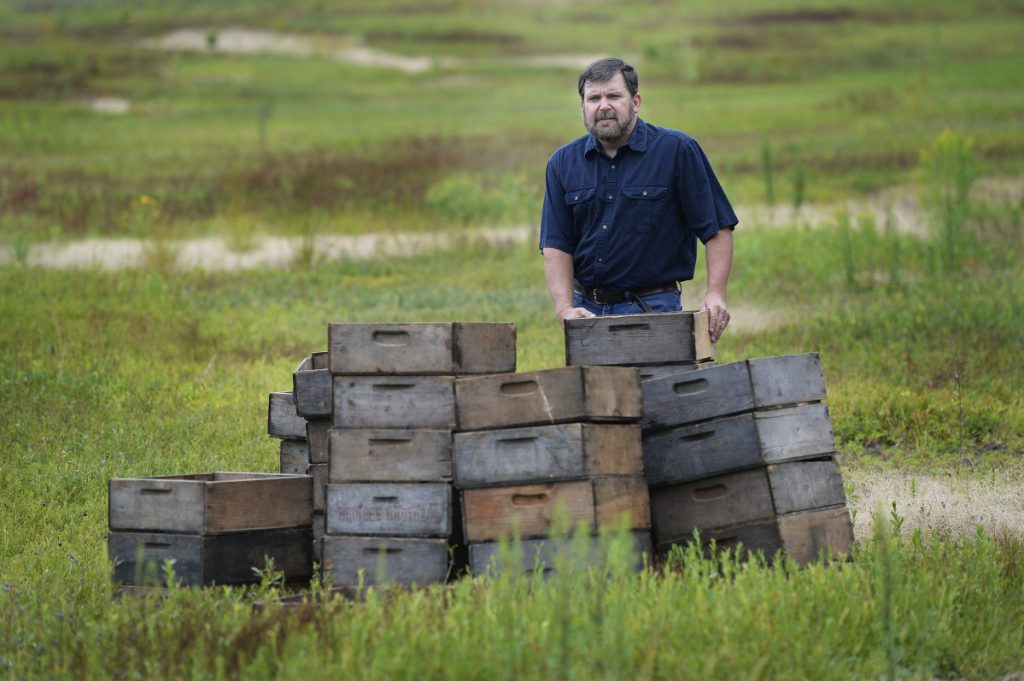
Wild blueberry farmer Greg Bridges, the former marketing chairman of the Wild Blueberry Association of North America, a trade group, says Maine’s small farmers are hurting from a host of financial pressures, and it’s hard to get Maine politicians to listen. Staff photo by Shawn Patrick Ouellette
On a recent muggy day in August, it had been too wet to rake. The winnowing machine was quiet inside the hangar-like work space in Baring, near Calais, which houses three generations’ worth of blueberry farming equipment. The small, sweet, antioxidant-packed Maine blueberry is “wild” in that it grows naturally in Maine, but farmers encourage it with inputs, and by clearing land for the fruit to spread. Some of Bridges’ equipment is quite old, some newish but still not entirely paid for, including a couple of mechanical harvesters bought with a government loan. “The USDA has been breathing down my neck about them,” Bridges said.
The only bright spot is the relationship he forged with Blue Sky Produce, a wholesale produce business run by Lynn Thurston. Through Thurston, the Bridges family sends berries off to places like New Jersey and New York, where a fruit as unique as the Maine wild blueberry fetches a decent price. Thurston said she pays about $3 a pound to the growers, a radical improvement on the going rate. Bridges’ three grown children did the raking. Even if Bridges could afford to hire rakers, he’d be hard-pressed to find willing and able bodies to do so Down East, where the ravages of the opioid epidemic are hard felt, a crisis running parallel to the economic one, inevitably braided with it.
“I have buried two kids that used to work for me,” Bridges said.
Wooden blueberry boxes stamped “Maine Blueberries” stood stacked 10 high and three deep; Bridges’ youngest son sells them for $40 each on Etsy to help defray the cost of his education at Colby College. The boxes are worn, vintage and provide a far better profit than the fruit itself.
Bridges is far too smart to be bewildered by the losing game of farming wild blueberries. From 2005 until about a year ago, he was the marketing chairman of the Wild Blueberry Association of North America, the trade organization that promotes wild blueberries grown both in Maine and Canada.
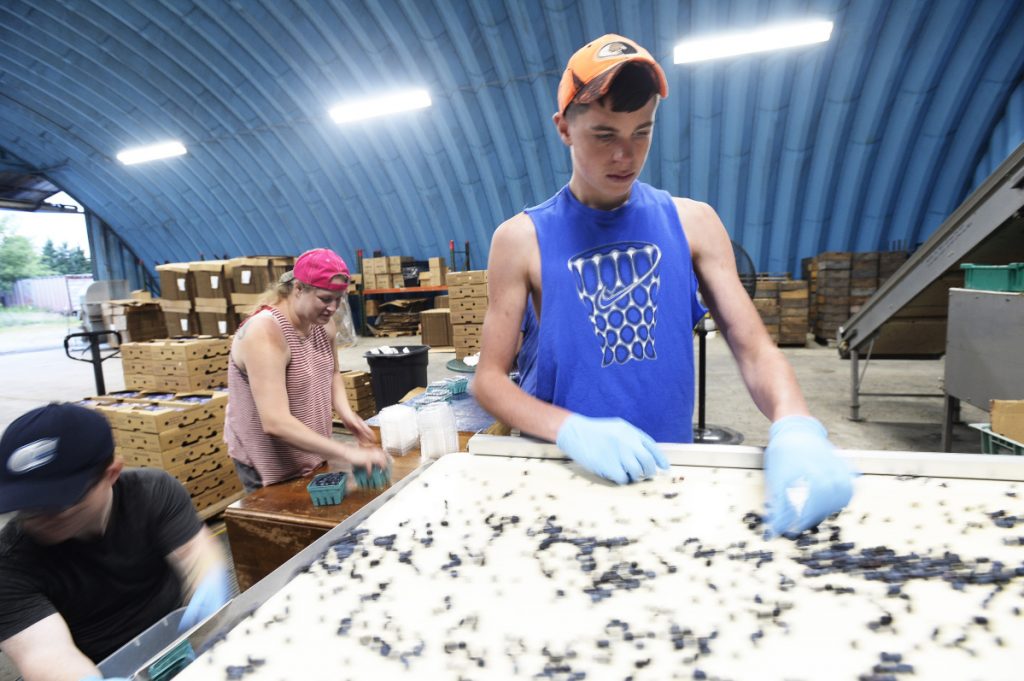
Everette Hanson sorts wild blueberries last month as they navigate a conveyor at farmer Greg Bridges’ fresh-pack operation in the Washington County plantation of Baring. Staff photo by Shawn Patrick Ouellette
But as he explains just how far south things have gone for him and other small farmers of this iconic Maine crop, there’s an undertone of disbelief in his voice. Wild blueberries define Maine in much the way lobster does. How can the bottom fall out, especially with good fruit on the vine?
He’s also angry. High on his list of culprits is Canada, the source of fierce competition for the crop. In recent years, Canadian farmers have rapidly expanded wild blueberry farming operations, with much help in the form of land deals and subsidies from their government. So are many Maine politicians, whom he sees as neglectful of the crisis.
“I tried to get hold of the governor last year,” Bridges said. “He blew me off.”
He said he and other blueberry farmers met instead with Daniel Deveau, the Maine-Canadian trade ombudsman appointed by Gov. Paul LePage but were frustrated by the administration’s lack of action. Bridges said they were advised to travel north to meet with Canadian growers themselves. That’s not a job he feels he should have to handle.
In a written statement, the Department of Agriculture, Conservation & Forestry defended the governor’s commitment to Maine’s blueberry farmers and described it as an “industry facing severe challenges due to international market forces.”
YELL FROM THE STATE HOUSE STAIRS
Down East, Canada can sound like a dirty word.
“They have gained tremendous amounts of land on both sides of the border,” Bridges said. “They have increased capacity to process fruit and store fruit. And the Maine growers, every year, if we get something that is above what it takes to break even, we feel good about that.”
Bridges has family in Canada, and he knows small blueberry growers there who have given up their farms as new growers have expanded and driven prices there down as well. Like a former farmer working at a gas station.
But the system seems rigged to him. Canadian companies participate in the Wild Blueberry Association of North America, but have a leg up in the dying business because of the plentiful government subsidies and the weakness of its dollar; Canada can undersell its berries to Americans. Maybe tariffs are the answer; Bridges isn’t sure.
“I would expect my governor to be yelling from the top of the State House stairs,” Bridges said.
Julie Rabinowitz, LePage’s spokeswoman, was traveling and referred questions to the Department of Agriculture, Conservation & Forestry. John Bott, the department’s spokesman, said LePage understands “the wild blueberry market headwinds” and had proposed an additional $1 million in annual budget funding to promote agriculture, including the beleaguered blueberry industry (as his proposal worked its way through the Legislature, the amount dropped to $500,000). In addition, since 2016, the Wild Blueberry Commission of Maine has received a total of $700,000 for various Agricultural Development and Specialty Crop Block Grants.
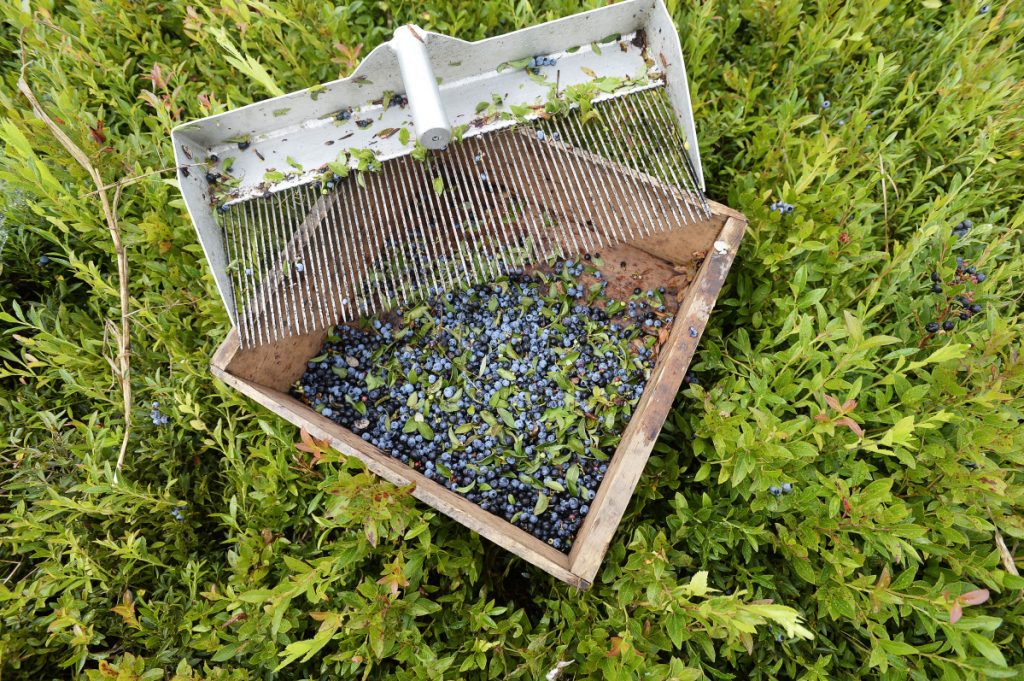
Greg Bridges says a federal government pledge to buy more than $9 million of Maine wild blueberries this year will help only the biggest processors. “It’s a short-term bailout that just kicks the can down the road,” he says. Staff photo by Shawn Patrick Ouellette
“Increasing demand for this wild, healthy and natural product is good for everyone,” Bott wrote. “We need Maine producers to prosper.”
At this point, they’re a long way from prosperity. And Bridges says the growers, especially the small ones, want and need more help.
While it might seem as though the U.S. Department of Agriculture’s pledge to buy more than $9 million of Maine wild blueberries this year would be a lifeline, Bridges said it helps only the biggest processors. “It’s a short-term bailout that just kicks the can down the road.”
HIGHEST BIDDER
The USDA buyback, the fifth the Maine blueberry industry has received since 2012, is part of the Section 32 government appropriation, established in 1935, to buy surplus commodities. It involves a bidding program that allows only the biggest growers and processors to participate. The idea is, they empty their freezers and prepare for another harvest. Most of Maine’s crop of wild blueberries – 67.8 million pounds harvested last year, according to University of Maine statistics – end up frozen because the fruit is too perishable to travel far. And only a handful of processors freeze fruit grown by Maine’s roughly 510 blueberry farmers (a figure from 2012, now an estimate that experts concede is woefully dated).
In other years, multiple preapproved vendors have bid on and won portions of that contract. This year, just one company, Cherryfield Foods, Inc., was awarded the bid, according to Nancy McBrady, executive director of the Wild Blueberry Commission of Maine. That was in late July.
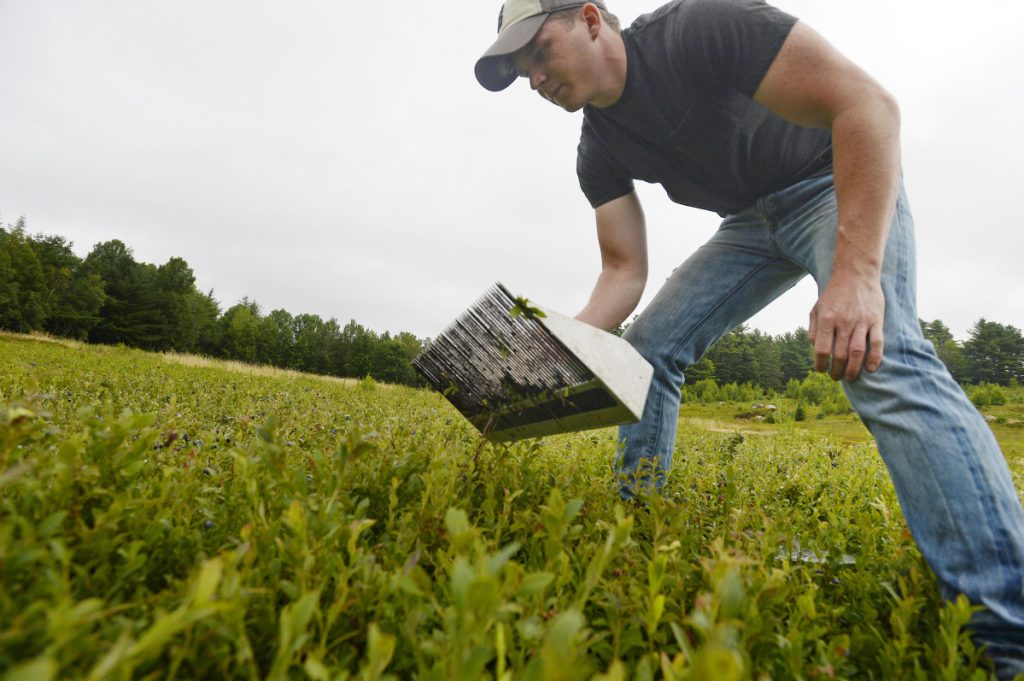
Tyler Bridges rakes blueberries in a field in Crawford last month. Staff photo by Shawn Patrick Ouellette
What stings for the Maine growers is that Cherryfield Foods is a subsidiary of a Canadian company called Oxford Frozen Foods, the largest supplier of wild blueberries in the world. Cherryfield Foods is one of the Maine companies that straddles the border, growing wild blueberries in both Maine and Canada.
Cherryfield will get $9.36 million for 8.57 million pounds of frozen blueberries, both ones harvested in 2018 and reaching back to 2016 (after three years in the freezer, the crop is no longer considered viable to sell). Much of it will begin moving into the National School Lunch Program and other domestic food assistance programs such as food banks later this year.
Bridges won’t get any of that $9.36 million. Neither will the rest of the small blueberry farmers in Maine, even ones who sold their crops to Cherryfield Foods.
“No small grower saw any of that money,” said farmer John Antil, who has about 71 acres of wild blueberries on Harmon Mountain Farms in the Washington County town of Northfield. “Not a red cent.”
The farmer negotiates a price with the processor after they’ve handed over their berries. For Antil, it might be early December before he knows what he’ll be paid by Wyman’s, the Milbridge processor he typically sells to. That company has always treated him fairly, he said, giving him a little better than an average price. By the time the processor is selling the berries to the USDA, they own the fruit, have paid approximately a penny a pound to keep it frozen and are under no obligation to pass on any profits from selling the blueberries. Which even in the case of a USDA payment of over $1 per pound, isn’t much. But it’s something. McBrady said the current estimate of cost of production for the small growers is 50 cents a pound.
Antil isn’t sure even his political representatives understand the limitations of the USDA program. “They think every blueberry grower in the state is getting this,” he said.
“Poliquin, he thinks it is a wonderful thing to get these USDA buyouts,” he said, referring to U.S. Rep. Bruce Poliquin, whose district encompasses most of the blueberry barrens in Maine and has worked to secure the USDA deals.
“Congressman Poliquin certainly doesn’t believe that the USDA buybacks are a silver bullet solution,” said Brendan Conley, Poliquin’s spokesman, in an email. Poliquin “cares deeply” about the industry, Conley added. “The Congressman wants to do everything he can to help.”
McBrady understands the frustrations inherent in the buybacks assisting just a few, or even one, grower/processor.
“In the long view, if we reduce inventory such that we are able to make room for the new harvest, ideally that moves the needle,” she said. Meaning that the price might be driven up for the next harvest. “I understand that is not of immediate benefit to the growers. But that is the design of the USDA program.”
Late last year, McBrady asked Maine Revenue Services to consider dropping the level of taxation on blueberry acreage in the unincorporated territories. In August, she learned that the state had agreed to cuts ranging from $200 to $500 an acre depending on the state of the fields. As she understands it, farmers have to ask for the abatement. But how many growers this will impact is unclear. Bridges said it won’t help him, but it will benefit the bigger growers. David Yarborough, the wild blueberry specialist with the University of Maine, said there is only a small cluster of unorganized townships in the heart of the blueberry-growing region between Routes 1 and 9.
OH, CANADA
Yarborough has worked closely with growers for 40 years (he’s retiring next June, so this is his last harvest). He’s heard it all in the course of those four decades, and from 2014 through 2016, saw three record Maine harvests in a row of over 100 million pounds.
Those were harvests to be proud of, but also a key factor in the precipitous price drop per pound. He’s watched as Canada has extended the size of its fields and taken a bigger chunk of the market, while simultaneously, the cultivated high-bush blueberry business has grown in the United States and elsewhere, cutting into possible sales for wild blueberries.
“You can blame Canada, or you can blame cultivated, but you can’t change what is going on in the world,” Yarborough said.
Yarborough said he doesn’t know exactly how many blueberry farmers are left from the 510 counted in the 2012 Farm Census. The state’s agriculture department doesn’t keep tabs. The University of Maine tracks the amount of the harvest and the prices only. It’s up to the U.S. Farm Census to tally the number of farmers and acres, and that happens only every five years (USDA was still collecting data for the 2017 census in late July).
What is clear is that those numbers are declining, along with profits. Farmers got one-third the price for their berries that they did in 2012. In 2007, when the census counted 577 Maine wild blueberry farmers, the price per pound was over four times what it is now. Between consolidations and the recent low prices, they are going out of business.
“It has been very rapid,” McBrady said.
The first time Greg Bridges reached out to talk about blueberries, he called from the dump truck he drives to make a living. “I am sitting in a gravel pit right now that used to be a blueberry field,” he said.
Yarborough said some small growers are letting land grow fallow, like Bridges. A late frost that brought 20 degree temperatures in June decimated fields in Nova Scotia, he said, and also damaged many Maine fields, cutting the yield. The average harvest, using imported bees (about three hives per acre) and inputs like fertilizer, is 5,000 pounds per acre.
“Even the large companies have some acres that are only yielding 2,000 pounds per acre,” he said. “So they are just mowing the land.”
Last year, the processors began telling the smaller growers they wouldn’t be able to take their crops this year, Yarborough said.
“I feel for the small growers that have been doing this all their life and now they don’t have any market for their berries,” he said.
‘NOT LIKE ANYBODY IS GETTING RICH’
Fresh market sales, as Bridges is doing with Blue Sky Produce, and Antil does on his own farm, do represent an alternative. But there are steps involved that limit how many farmers can go that route, Yarborough said. The machines that prepare the berries for the fresh market cost between $15,000 and $20,000, he said. There’s also food safety training to go through. “You can’t put up junk.”
“So it’s not like they can just flip the switch and start doing fresh pack,” he added. Or organic, which brings in better prices at the processor, but it takes three years to become certified.
Blue Sky Produce founder and owner Thurston said she’s working with 10 to 12 small-scale blueberry farmers now, selling their berries. “Every year, I seem to get a few more,” she said.
“Fresh pack looks pretty attractive to someone who is only getting 20 cents a pound. But it is a lot of work and it is not like anybody is getting rich off this.”
This fiscal year, Blue Sky Produce received a $10,000 agricultural development grant – one of the funding sources Bott referred to – to do demonstrations at stores in the New York and New Jersey area to show how good the fruit is fresh.
“I hope I am helping, is all I can say,” she said. “It takes a lot more than me doing this to keep them afloat.”
Thurston pointed out that the Wild Blueberry Commission and the marketing association devote much of their promotional efforts to frozen berries, which undeniably, is how the bulk of the blueberries coming out of Maine end up. “And they always come up with new recipes, which is all great,” Thurston said. “But they never, ever promote fresh.”
She wonders if the industry as a whole wants the fresh pack producers to go away.
“Because there is a lot of farmers going out of business and guess who is there, ready to buy up the land?” Thurston said.
She’s not going away, though, and she remains hopeful. So does Yarborough. Unless the fields are sold for development, or turned over to orchards or other agricultural use, they’re “fairly easy” to bring back into production.
“The question is, will the price come around to the point where it doesn’t undermine their ability to operate?” Yarborough said.
Antil is 75. When he and his wife bought their land in 1980, they hoped to leave behind a farm for their family. But that feels more and more unlikely to him. The pressure to compete with odds stacked against them is similar to the pressure felt by Maine’s lobster industry to compete with Canada, which has a competitive edge because of its weaker dollar and better tariff scenarios, he said. Or potatoes.
“I won’t live long enough to see lobster go out,” Antil said. “But I will live long enough to see the blueberries go out.”